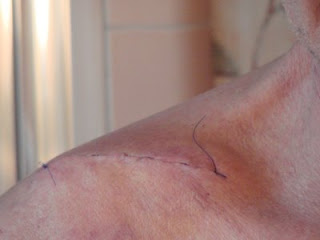The young skateboarder with the torn jeans and dirty, wrinkled T-shirt, slouched in his chair. He looked terribly alone as his head leaned back against the wall, staring blankly at nothing, his eyes angry and ready with tears. The small cubicle in the busy emergency room had no space for a bed, just two chairs, the other one occupied occasionally, but briefly and uncomfortably, by one of his friends. One at a time they would seem to begrudgingly leave the small group of young men who had gathered in the waiting room, laughing and playing cards, bored and apprehensive, unaccustomed to the antiseptic smell of the hospital.
It was not immediately obvious whether the disheveled young man sitting opposite my daughter and me was injured or ill, but as I watched him I noticed his right shoulder sloped lower than his left, and he carefully cradled his right arm with his left hand as if holding it in place. "Compound fracture of my collarbone. I broke it in 3 places" he said in answer to my questioning. Tenderly letting his right hand rest in his lap he pulled back the neckband of his logo-laden T-shirt, exposing a jagged piece of his collarbone jutting through the skin of his shoulder. Despite the Tylenol 3 he had taken, he was still clearly in pain. However, there was more hurting than his broken bones and bruises.
He winced as he described the accident that started with attempting a stunt at excessive speed and led to being catapulted off of his long board onto the concrete, landing him in emergency. Then he told me why he was really hurting. "What really sucks is that my wife could not bother to come to the hospital." It was obvious that the physical pain was being eclipsed by the heartache he felt, alone with only his haphazard friends to comfort him. "She would rather stay at the party then come to be with me." The rest of the story came gushing out like water as if a high-pressure tap had been turned on. He was 21 years old, and had married his 18-year-old sweetheart when he was 19. With a twisted grin, physically mimicking the simultaneous pain and irony of it, he said, "till death do us part I vowed... I meant that!"
In just a few minutes, after having asked a couple of innocent questions, the young man's heart was beating out loud for all who might care to hear. Despite the bravado, the physical environment of the hospital, even the injuries that brought him there, conspired to lay bare his soul. I felt his pain. I was humbled by it. Yet I was reassured by his willingness to openly share this hurt with a stranger who had little in common with him.
I have noticed that there are two basic responses I have to pain or loss of any kind, including my diagnosis of Parkinson's disease. The first and more prevalent reaction is that of stoicism, a type of denial that tries to convince everyone, "It is not that bad. The last thing I want is for you to feel sorry for me." What I expect really comes through is, "I am uncomfortable with being portrayed as weak, afraid of being in need, demanding my independence." This has the initially desired effect of keeping people at bay, ensuring that uncertainty and lack of confidence, that soft underbelly of humanity, are not exposed. We try to fool people with heroics, hoping that they do not see the fear in our eyes. But, of course, the consequence of this "mental toughness" is to convince others that I do not need them; it is an obvious lie.The alternative response is when I react to pain or peril, illness or injury, by crying out in a mixture of anger and shame. Like the Simon and Garfunkel 1968 hit, “The Boxer”:
In the clearing stands a boxer and a fighter by his trade
And he carries the reminder
Of every glove that laid him down or cut him
‘Til he cried out in his anger and his shame
I am leaving, I am leaving, but the fighter still remains.
We are, after all, vulnerable and human, sometimes bruised or bleeding. To think, talk or act inconsistent with that reality is to mislead others, and ourselves, pretending to be what we are not. We are all in need of love, and at least some expression of it, especially when we are most vulnerable. To deny that need is to deny our humanity. But perhaps even more importantly, our façade of fearlessness rejects or holds at arms’-length those who wish to care and express their concern. And in the process we remain self-imprisoned by our secret pain.

In a sense, we are all in the hospital emergency room, at least from time to time, with our own hurts and heartaches, waiting to be discovered or known despite our proud resistance. Waiting for those who would stay with us, and pray with us, and share our pain and sorrow. And in that way we all may learn the wisdom to be wounded healers.










Hi Bob, I really felt and have lived the lie, I'm alright Jack. I'm too hard to feel pain. I have been to your hospital emergency room, and your article hits the bullseye, no matter how tough or hard you think you are Parkinson's Disease hurts you in so manny ways.I can remember the first time I wet myself while having a scan in hospital, I wish I could just disappear. But you need to find inspiration and Like you I have an Angel for a wife, and 2 good friends my children.always look on the bright side of life,( Monty Python )
ReplyDelete